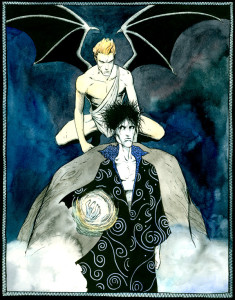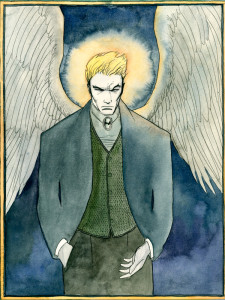In his “Afterword” to the Vertigo series Lucifer (1999 – 2006), Mike Carey explains that when he set out to tell Lucifer’s story, “or the next installment of his story, after the chapters already told in the Bible, Milton’s Paradise Lost, Blake’s Marriage of Heaven and Hell and Neil Gaiman’s [Sandman],” he swiftly discovered:
Lucifer didn’t want to be my mouthpiece. More than any other character I’ve ever written, he insisted on going his own way.…[M]y protagonist turned out to belong to that rare subspecies of characters who—to paraphrase Neil…—have their own lives off the page and move while you’re not looking.1

The intriguing persistence of Carey’s Lucifer character to go his own way, as it were, places him firmly in the tradition of Miltonic-Romantic Satanism.
William Blake had famously written in The Marriage of Heaven and Hell that Milton was “of the Devils party without knowing it[.]”2 In the Blakean reading of Paradise Lost, the poem’s sublime Satan essentially sprang forth uncontrollably from Milton’s mind, just as Sin burst unbidden out of Satan’s head (II.749–58). The Puritan Milton, in a Frankensteinian sense, lost control of his creature, his monster.3 Satan could not escape the will of the God who was writing his fate, but he somehow broke free from the will of the poet who was writing his lines. “As if misplaced in the ideological structure of Milton’s epic,” writes Peter A. Schock in Romantic Satanism, “the figure of the fallen angel invited his own excision and insertion into different contexts.”4 Milton inadvertently counteracted his own characterization of the arch-villain of Judeo-Christian theology, as Milton’s Satan is anything but abstract evil personified.
More aware than Milton of his character having a will of his own, Carey dramatizes this loss of control of his character in Lucifer’s final confrontation between Lucifer and Yahweh, the fallen angel’s Father/Creator. Face-to-face with His disobedient son one last time, Yahweh reveals that He envies Lucifer, fascinated as He is with the one to have “escaped [his] function,”5 and so Yahweh offers Lucifer the proposition of an exchange of identities: Yahweh would get to know his son better and Lucifer “would be the Maker” and therefore “would be perfect again. Unfallen. Unscarred by experience.”6 But in the Lucifer series, Lucifer never wanted to be God—not in terms of becoming his Father, Yahweh—but rather to achieve freedom from God, to completely sever himself from his Father.
In a flashback to the War in Heaven’s denouement, a defeated but nonetheless defiant Lucifer suddenly finds Almighty God appear before him, Yahweh reassuring His son that He sees the angels not as “tools” so much as “the aspects of myself through which I act,” to which Lucifer cries out in desperation, “No! I am myself. Not a limb or an organ of yours. I separate myself from you. You can kill me. But you cannot claim me back!”7 In their final meeting in the series, Yahweh requests far more than reclaiming His angelic son as an extension of Himself, and Lucifer is not at all tempted to give over his identity, even if becoming God be the prize.
Lucifer may not be all-powerful, he may not be free in the absolute sense he so desires, but he is and always will be himself. Lucifer thus flatly refuses his Father once and for all: “This face is mine. This scar — is mine. You may not have them. Not with my permission. My answer is no.”8 Vertigo’s Lucifer series concludes with its titular anti-hero victorious, Lucifer venturing into the void alone and undaunted: “On into the void he flies. Unafraid. There is nothing in mere absence that might cow him. Or loneliness. Or the lack of maps or charts. For he is his own path. And he sees by his own light.”9 Lucifer thus attains an ultimate triumph his Miltonic-Romantic predecessors never had—one entirely appropriate for their true heir.
Mike Carey’s Lucifer, like Neil Gaiman’s Sandman, creates a grand mythos, playing with faded gods of past pantheons as it establishes its own vast world. As larger-than-life as Lucifer is, however, the series is truly down-to-earth insofar as it explores deeply human dilemmas. Lucifer’s heart and soul is the problem of free will writ large—a vision of struggling individualism magnified to cosmic proportions, as Carey explained in a 2005 interview with Comic Book Resources:
Lucifer is about the big cosmic struggle but on a smaller level it’s about family and how within family, there is a kind of dialectic of freedom and control. It’s all summed up by the relationship between Lucifer and God – God is his father and Lucifer is like any son, he wants to be himself and wants to be the author of his own life. The trouble is when your father is God, everything is controlled by your father and the autonomy that Lucifer seeks is elusive. It’s about that struggle, that never ending quest to be yourself.

In Paradise Lost, Milton’s Satan is at the end of his journey humbled in Hell by the Almighty’s omnipresent power; in Cain, Byron’s Lucifer simply disappears when his work is done; in Lucifer, however, Carey’s Lucifer ends his 75-issue journey on a triumphant note. As Lucifer refuses God’s offer to swap identities and exits into the void, we know that whatever is—or is not—there, Lucifer is finally free. As his cosmic self-assertion is a struggle we can all relate to in our own personal struggles to stay true to ourselves, Lucifer’s final victory is undeniably uplifting. In this, Vertigo’s Lucifer Morningstar not only matters, but is of the utmost importance to the Miltonic-Romantic-Satanic tradition.
Notes
1. Mike Carey, “Afterword: The Devil’s Business,” in Lucifer: Evensong (New York: DC Comics, 2007), pp. 213, 214.↩
2. William Blake, The Complete Poetry and Prose of William Blake, ed. David V. Erdman, rev. ed. (New York: Anchor Books, [1965] 1988), p. 35; pl. 6.↩
3. The first to employ the Frankenstein monster metaphor appears to be John M. Steadman in “The Idea of Satan as the Hero of Paradise Lost,” Proceedings of the American Philosophical Society, Vol. 120, No. 4, Symposium on John Milton (Aug. 13, 1976), p. 264: “Like Dr. Frankenstein, Milton was apparently unable to control the powerful figure he had created.” It is a sentiment anticipated by E. M. W. Tillyard in Milton (New York [rev. ed.]: Chatto & Windus Ltd, [1966] 1967), p. 234: “…I do not see how one can avoid admitting that Milton did partly ally himself with Satan, that unwittingly he was led away by the creature of his own imagination.”↩
4. Peter A. Schock, Romantic Satanism: Myth and the Historical Moment in Blake, Shelley, and Byron (New York: Palgrave Macmillan, 2003), p. 3.↩
5. Carey, Lucifer: Evensong, p. 160.↩
6. Ibid.↩
7. Ibid., p. 135.↩
8. Ibid., p. 160.↩
9. Ibid., p. 161.↩